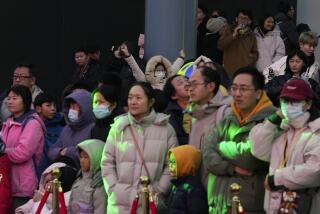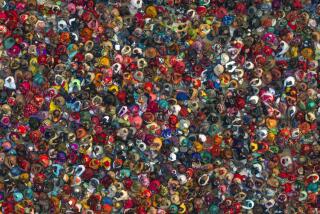Chinese census takers have their work cut out for them
- Share via
BEIJING — How do you count 1.3 billion or so people?
Here in China this week: Door-to-door.
Politely.
Covering your dirty shoes with plastic wrappers before entering homes as you provide reassurance that sensitive information -- about residency permits or babies who violate China’s one-child policy -- will not be shared with other authorities.
But beware of dogs.
China on Wednesday is completing the world’s largest census, one so big that it has required 6 million census takers, more than the entire population of many countries. This is the sixth nationwide census China has conducted, its first since 2000, and one with a few new wrinkles.
In an effort to tally China’s staggering migrant population, estimated at more than 200 million, census takers are seeking to count people where they live, rather than at the homes where they have their hukous, or residency permits. Until a decade ago, people who had moved to big cities without permits could be arrested and deported.
Census takers have also offered stronger assurances this time that the information they collect will remain confidential. Data on family planning, taxes, landownership and residency permits are all, at least in theory, kept private by the census.
“This is only about statistics, but people are worried that they could get fined for having an extra child and they’ll avoid the census,” said Duan Chengrong, head of the population department at Renmin University. “Like in the U.S., the Chinese these days are paying more attention to their privacy.”
Before the 10-day census, the Chinese government began a massive awareness -- some might say propaganda -- campaign. Large green banners garlanded across streets throughout the country read: “Conducting a census -- establishing a harmonious society.”
In alleys near the Beijing South Railway Station, where migrants from the countryside live in housing not much larger than some American bathrooms, census takers make repeat visits at different times of the day, hoping to catch otherwise elusive residents by surprise.
“They come sometimes at 10 p.m. to find us,” said a woman from Anhui province who was washing clothes in an outdoor sink.
At a neighborhood committee office, a 64-year-old woman wearing a Mao Tse-tung button on her red jacket said that she had barely slept since the census started. “The population is so mobile. And some won’t open the door. We just keep going back until we find them,” she said.
The life of a census taker is not easy. Their pay is about $150 for a month’s work and many report being bitten by dogs. In one neighborhood in the southern city of Guangzhou, 11 of 32 workers had quit by the third day of the census, according to the Southern Metropolis Daily newspaper.
Difficulties in getting information are sometimes even greater in wealthy neighborhoods than in poor ones. A Chinese journalist who went out with census takers during a preliminary census in August reported that only one resident opened the door in a posh gated community of 39 villas in the suburbs of Beijing. Often nobody answered even though people could be seen behind closed curtains.
“The rich worry more about their privacy. They may have second or third homes or mistresses they’re hiding away,” said Zhou Xiaozheng, a sociologist at Renmin University. “But it’s true of ordinary people as well; they’re not willing to cooperate with the government the way they used to in the old China.”
Many say they have been reassured by the government’s declaration that information cannot be used to levy fines, which often run as high as six times an annual income for extra births.
Census methods have varied by location. Millions in Beijing received Short Message Service communications on their cellphones instructing them to cooperate. In some neighborhoods, census takers have offered towels or shopping bags as token gifts to coax people into answering the questions. Elsewhere, census takers have been allowed to call in the police if residents refuse to answer the door.
Similar to the census process in the United States, most people are given a standard form with a few basic questions: 18 of them centering on names, ages, occupation. Ethnicity is also asked, but not religion, that being a sensitive subject in a communist country that is officially atheist. One-tenth of the population, meanwhile, was selected for a longer, 45-question form that includes queries about income, savings, the type of water one drinks (tap or boiled) and the number of bathrooms in the house.
The census data are expected to be published in April. Among the questions of keenest interest to demographers: How many people have migrated from their homes in the countryside to work in the cities? How much has the male- female ratio been skewed by the traditional preference for sons with a one-child policy in place? How has the ethnic balance changed in sensitive areas such as Tibet and Xinjiang where minorities complain that an influx of Han Chinese is diluting their cultures?
And, in the end, the ultimate census question: Just how many Chinese are there, really? At the last count, a decade ago, the figure was 1.27 billion. United Nations estimates put China’s population today near 1.4 billion.
Nicole Liu of The Times’ Beijing Bureau contributed to this report.
More to Read
Sign up for Essential California
The most important California stories and recommendations in your inbox every morning.
You may occasionally receive promotional content from the Los Angeles Times.













